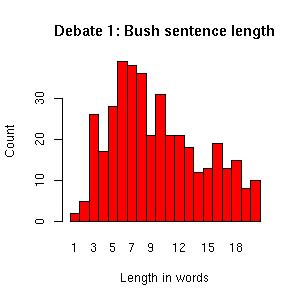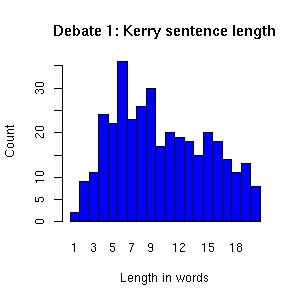October 01, 2004
Does size matter?
Well, John Kerry's is 17.7% longer than George Bush's. We're talking about average sentence length, of course.
Yesterday I posted about the question of whether it's true, as (the NYT says that) Kathleen Hall Jamieson said, that "The language of decisiveness is subject, verb, object, end sentence." Let's pass over that issue in silence today, and try interpreting Kathleen's suggestion more charitably. Maybe the way to seem authoritative and decisive is to use simple sentence structures, of whatever kind. I'm not sure how to frame that hypothesis in a testable way, so I thought I'd look at last night's presidential debate in terms of a simple proxy measure, namely sentence length.
"Before I answer further", as Kerry put it, let me say that my overall impressions of the debate were in tune with what has emerged as the conventional wisdom. First, the debate was much better than I expected, maybe not "the best presidential debate in decades" (as conservative pundit Jonah Goldberg suggested), but not at all the boring montage of dueling campaign ads that I thought it would be.
And I think that Kerry did very well, both in content and in form. I agree with Jay Nordlinger, managing editor of the (conservative) National Review:
I thought Kerry did very, very well; and I thought Bush did poorly — much worse than he is capable of doing. Listen: If I were just a normal guy — not Joe Political Junkie — I would vote for Kerry. On the basis of that debate, I would. If I were just a normal, fairly conservative, war-supporting guy: I would vote for Kerry. On the basis of that debate.
In terms of self-presentation, Kerry seemed "succinct and sharp", as Mickey Kaus put it; "calm [and] authoritative", (Andrew Sullivan). In contrast, Bush seemed "smug and contemptuous" (Kaus); "snippy and peevish" (Sullivan); "lost" and "tense or impatient or peeved or even a bit miffed that he even had to be up there on the stage with Kerry." (Josh Marshall). If I were playing poker with George W. Bush, I'd watch for those multiple rapid-fire eye blinks, and I'm pretty sure I'd know what they meant.
But was there anything (simple) about the form of their language -- as opposed to its content -- that corresponds to those judgments? The most obvious simple thing to check is sentence length, and there was certainly a difference in that respect between the two men last night. It went the way you'd expect; but I don't think it made any real difference.
I took the debate transcript from the www.debates.org web site, and ran a few simple programs over it. (With transcripts of spoken material, there are always questions about what constitutes a sentence -- I didn't second-guess the transcribers, but just accepted the sentence divisions implied by their choice of punctuation).
Bush's contributions totalled 6,165 words in 476 sentences, for an average sentence length of 12.95. Kerry's side was 7,136 words in 468 sentences, for an average sentence length of 15.25. Thus Kerry's average sentence was about 17.7% longer.
Both men's longest sentences were in the range of 60-70 words. Within the range of sentences from one to twenty words in length, there's one striking feature: Bush used many more 3-word sentences (26) than Kerry did (11).
 |
 |
Here are Bush's 26 three-worders (in alphabetical order):
And I do. And I'm optimistic. And he has. And we will. Every life matters. He changes positions. I know that. It's hard work. It's hard work. It's hard work. It's incredibly hard. Let me finish. Libya has disarmed. Look at Libya. Missy understood that. Thank you, sir. That's my job. That's totally absurd. We tried diplomacy. We will succeed. We're communicating better. We're making progress. We're making progress. Why should he? Yes, let me... You know why?
A few of these are even SVO, but whatever their form, I don't think that these short, punchy phrases are really contributing to a sense of authoritativeness or decisiveness. On the contrary, many of them register with me as helping to create the impression of someone who was "snippy", "peevish", "impatient", and "miffed that he even had to be up there".
That's not because short phrases are intrinsically either authoritative and decisive, or snippy and peevish. I hope it won't shock anyone if I venture to suggest that authoritative and decisive material sounds authoritative and decisive, whether its sentences are short or long, while snippy and peevish phrases seem -- you guessed it -- snippy and peevish, whatever their length or their exact grammatical analysis. That's because "decisive", "peevish" and so on are really characteristics of people and their actions, attitudes and intentions, not characteristics of sentences and their form or size at all.
In the other direction, Kerry's eighth-longest sentence was this one:
The center is Afghanistan, where, incidentally, there were more Americans killed last year than the year before; where the opium production is 75 percent of the world's opium production; where 40 to 60 percent of the economy of Afghanistan is based on opium; where the elections have been postponed three times.
This sentence shows that John Kerry is one of those "[p]eople who speak in sentences that contain parenthetical phrases, people who begin a sentence and then deflect to add a series of illustrative examples before they end the sentences", to quote Kathleen Hall Jamieson again. Nevertheless, this 51-word sentence was part of one Kerry's more rhetorically effective passages, in my view.
Maybe certain properties of sentences are correlated with certain properties of the people that use them. No doubt we make those associations all the time. But be careful: every one of these linguistic coins has two evaluative sides. "Staying on message" can also be "repeating the same thing over and over". "Strong, simple language" can also be "brusque, contemptuous sound bites". "Beginning a sentence and then deflecting to add a series of illustrative examples" can also be "hammering home the point with a succession of facts".
[More linguistic analysis of debate #1 here, here, here, here, here., and here. ]
Posted by Mark Liberman at October 1, 2004 04:11 PM